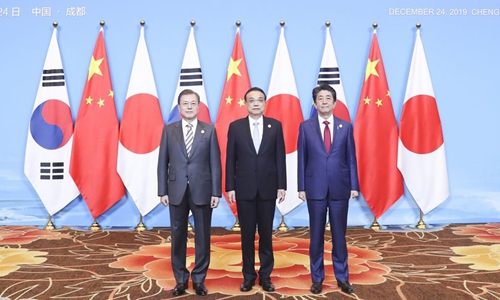HOME >> OPINION
Trilateral summit signals chances of thaw
By Li Ruoyu Source:Global Times Published: 2019/12/26 16:53:40

Chinese Premier Li Keqiang poses for a group photo with South Korean President Moon Jae-in and Japanese Prime Minister Shinzo Abe before the eighth China-Japan-South Korea leaders' meeting in Chengdu, Southwest China's Sichuan Province, December 24, 2019. Photo: Xinhua/Yao Dawei
The trilateral summit held in Chengdu in Southwest China's Sichuan Province on Tuesday underscored the diplomatic influence of China as a great power in addition to creating anticipation about a bounceback in ties among China, South Korea and Japan.
The South Korean government's lack of trust in Japan stems from historical issues. Former South Korean president Park Geun-hye attempted to settle these historical conflicts through diplomatic means including signing the Japan-South Korea "comfort women" agreement in 2015. But judging by the incumbent Moon Jae-in administration's Japan policy, Park's efforts were futile and Seoul's future Tokyo policy will move along nationalistic lines.
In fact, Japan has been aware of nationalist sentiments inside South Korea for long, and insisted on adding the statement that the "comfort women" agreement should represent the "final and irreversible" settlement of this issue.
But with South Korea's government changes, its Japan policy has moved significantly. As a result, Japanese Prime Minister Shinzo Abe's disappointment has transformed to a negative sentiment, driving the country's policy for South Korea to become increasingly tougher. This is the root cause of conflicts between the two Northeast Asian countries since Moon assumed office.
Unpleasant incidents between the two countries, such as the radar lock-on controversy and the trade friction, have further increased the difficulty of resolving their disputes. The two state leaders in fact met many times at international events before this summit, but their contacts were limited. Around 15 months after their last official summit in New York in September 2018, this meeting in China finally made them sit together.
From New York to Chengdu, Japan-South Korea talks were always held in a third country. A theory of international relations - trilateralism - may well explain this. It means three countries joining hands to handle international issues and conflicts, which can go beyond bilateral differences.
The existence of US-Japan and US-South Korea military alliances has determined that Washington can exert a direct influence on the two Northeast Asian countries' governments. US Defense Secretary Mark Esper undoubtedly played a key role in keeping the Japan-South Korea General Security of Military Information Agreement at the last minute.
But the US can only serve as a palliative. In particular, Tokyo and Seoul are now involved in a political tit for tat. So addressing economic and cultural issues is needed to mend ties. But today's US is unable to bear such a heavy responsibility.
Strengthening Japan-South Korea economic cooperation requires a regional framework. But the US, under the leadership of President Donald Trump, pursues anti-globalization and protectionism. Culturally, Japan, South Korea and China belong to the East Asian cultural circle, but the US is outside the region.
The country most suitable for mediating the two Northeast Asian neighbors is China, as it is able to promote economic cooperation and meanwhile connect with them culturally. China being the host of this summit is an important reason why Abe and Moon can talk.
The Trilateral Cooperation Vision for the Next Decade released Tuesday by China, South Korea and Japan covers the above-mentioned aspects.
Economically, the vision includes advocating "open and win-win cooperation" from macroscopic aspects, as well as exploring specific economic cooperation paths at the micro level, such as promoting the Regional Comprehensive Economic Partnership talks and "speed[ing] up the negotiations on the Trilateral Free Trade Agreement."
Culturally, the three countries jointly decided to "promote mutual learning in the fields of culture and people-to-people exchange" and "carry forward East Asia's cultural traditions." This decision shows that the three sides share the same cultural identity.
Politically, the three state leaders reaffirmed their agreement on the denuclearization of the Korean Peninsula. Beijing and Seoul also "hope that the abductions issue between Japan and North Korea will be resolved through dialogue as soon as possible," which may offer Tokyo hope for further China-Japan-South Korea cooperation on the Korean Peninsula.
During the subsequent bilateral talks between Abe and Moon, both reiterated the existence of differences in spite of expressing their willingness to improve ties. Based on what has been disclosed so far, their talks conveyed a positive attitude, but failed to point the way toward a better bilateral relationship.
This China-Japan-South Korea summit is undoubtedly successful. It provides a framework for the future pattern in East Asia, that is, China-Japan-South Korea trilateral cooperation will be promising and can help ease tensions between Tokyo and Seoul.
The author is an associate professor at the School of History & Cultures, Sichuan University. opinion@globaltimes.com.cn
Posted in: ASIAN REVIEW